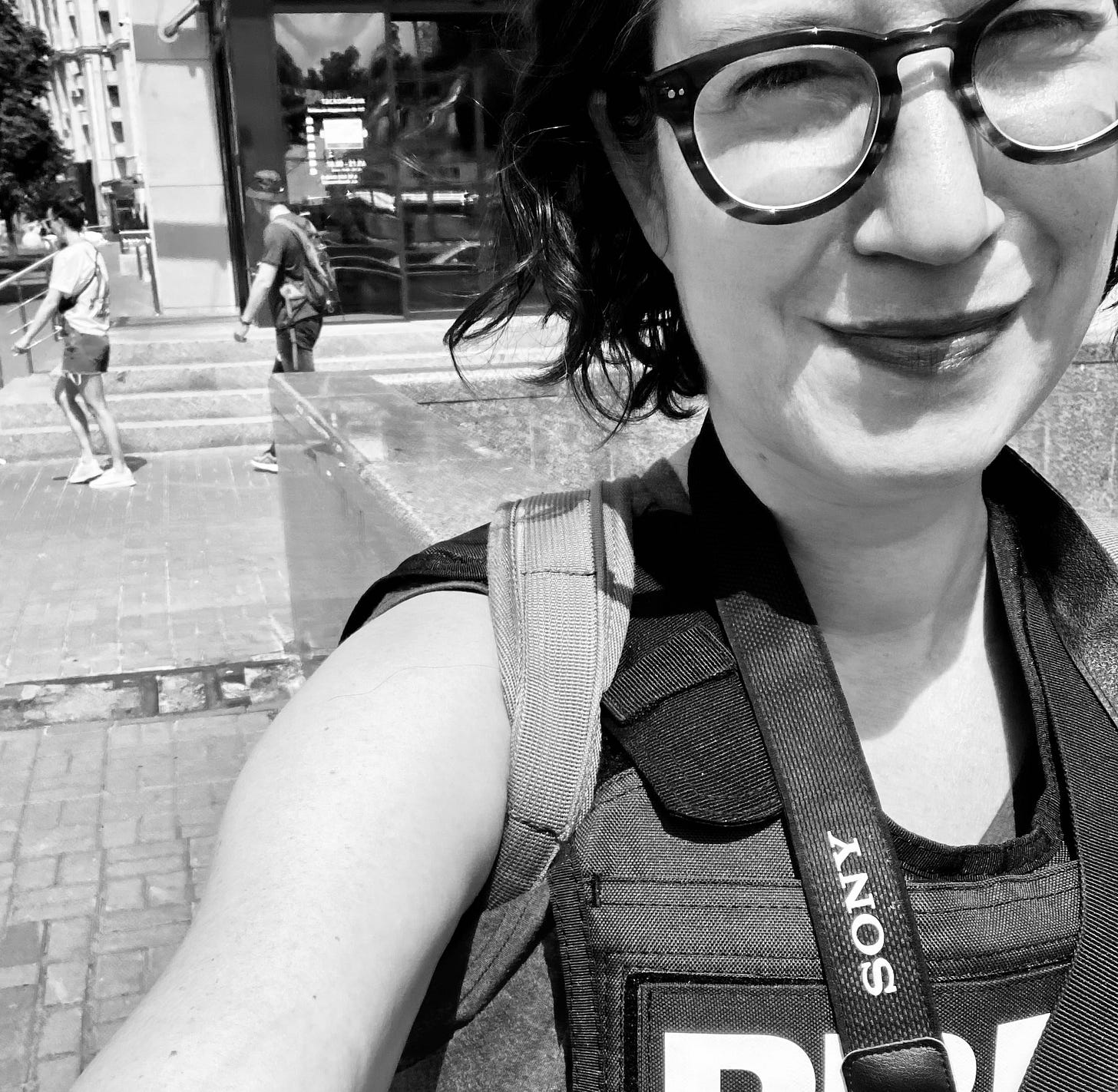Dear writer: Advice on tackling difficult stories
On taking the “glass-bottom-boat approach” in first-person writing to interpret painful stories for your readers
We asked
for her advice on tackling heavy subject matter while keeping her audience engaged. Lauren is an award-winning journalist and photographer of more than 20 years. She spent more than a decade reporting from war zones in which women and girls are violated and, before that, five years documenting violence and the suppression of journalists globally.She has written for The Atlantic and The Guardian and is a contributing writer for Washington Monthly and an adjunct professor at NYU’s graduate school of journalism. Lauren writes from the front line of conflict in her newsletter,
, and gives a behind-the-scenes look at how dangerous investigative journalism gets made. Read on for her response.Dear writer, how do I use Substack to cover heavier topics?
Dear writer,
By the time I came to Substack at the start of 2021, I’d been covering—as one editor once put it—the stories that “make people cry” for nearly 20 years. I’d reported from places like an impoverished village in the Democratic Republic of Congo and sunbaked Syrian refugee camps; I’d spent a few years in the 2000s at the New York Times reporting on the deeply personal horrors of 9/11.
While stories of trauma fascinated me and deserved telling, I was never sure how many people wanted to read them. It seemed like I’d developed a core readership, but it was limited. Then, my second stint at the Times ended last year in my very public firing, and I became infamous. It was brutal.
People sent death threats and abuse my way every day for months. But something pretty great came out of the nightmare too: I started hearing from new readers of my work, thanking me for writing about the really hard-to-cover stuff.
Still, they had questions: Why hadn’t they heard about this or that atrocity before? Honestly, I didn’t know. I’d written big stories involving war crimes and violations of international human rights in The Guardian, The Atlantic, and so on. I wondered whether to blame the outlets because they didn’t position my stories high enough, or the readers because they’d avoided clicking on the hard-to-digest stories.
Eventually, I landed on a third answer. While I don’t let the outlets and readers entirely off the hook, I realized that I deserved a good portion of the blame too. You can’t just sling pain at people nonstop and expect them to stomach it over and over. And, in a time of deep mistrust of journalism, you can’t expect readers to understand why this kind of work is critical, and how it is constructed differently from political and other kinds of reporting. How can anyone understand the difficult ethical choices involved in such work—or why they should care—if we, as journalists, don’t bother to make that kind of explication part of what we do?
That’s how I found my mission on Substack. I realized that the platform was a gift to me as a writer—and to readers—if I used it to start offering more than is usually possible in traditional media.
For the kind of journalism I do, that meant that I suddenly had a space to go behind the scenes, to show readers that, even if they can’t relate to the people I write about at first, they can relate to me as the storyteller. They can see what happened as I experienced it. I could show the process of gathering information and how I’d put it together in certain ways, and why.
I set about writing what became a 12-part series looking behind the curtain of the seven years I spent reporting on that village in Congo, and the nearly 50 little girls raped there. I answered questions I’ve been asked many times over the years, things like: How did you get your story idea? How did you stay safe? Who paid for everything? How did you get vulnerable people to talk to you? How did you protect them? And, for me, one of the most important questions: How did you navigate so many different ethical decisions in making this story?
For instance, I was able to write a post about the time the Congolese intelligence service detained me and my fixer. It was a story I hadn’t found a place to tell anywhere else but showed some of the inherent danger in working in corrupt places, and the vast difference between my getting in trouble vs. my local fixer, who is always going to be in a much more precarious situation. I was also able to write a post about the fact that $10 nearly derailed my entire investigation, showing not only the complications of negotiating interviews with sources but how much it meant that the women I spoke to were willing to take off a day in which they would normally earn a desperately needed single dollar.
In the course of offering these answers, I had a chance to retell what had been done to the girls in a new way, one that would attract new and different readers. Their story—and the landmark decision that brought them justice—would spread even farther.
Being a journalist means you are a kind of interpreter. And I decided that the translation of the kinds of painful stories I tell could be much clearer with this added “insider” element.
I’ve been able to write posts that interpret my reporting in Ukraine in ways I could only refer to in stories I’d published in traditional media outlets. I explained the complexities involved in using found Russian documents and how they could transform from detritus left behind to evidence used in war crimes trials. And in another post I was able to use my many years of reporting on sexualized violence in conflict to put what I’d been learning about rape in Ukraine into the historical context of war crimes prosecutions, and how such crimes can be considered part of the Russians’ genocidal intent.
Being a journalist means you are a kind of interpreter. And I decided that the translation of the kinds of painful stories I tell could be much clearer with this added “insider” element.
Usually I end up writing about the things that just won’t get out of my mind—they’ll sort of tickle for days or weeks at a time until I decide they need more reporting. Sometimes that means my other posts will allow a more nebulous idea I’ve had floating around my head to finally solidify, as they did when I set about writing this piece about the everyday sexism of being a woman war correspondent. Or this one, which got at the core of what had drawn me to report in Ukraine: Why were there so many strange echoes with the Holocaust and antisemitism in this present-day conflict?
I’ve written many, many posts with this kind of x-ray view, which offers readers insight from experts and from my on-the-ground reporting—but with the kind of inside-out, glass-bottom-boat approach that translates well in first-person writing.
In a similar attempt at transparency, I posted a series asking journalists I admire why they believe in journalism. People like Margaret Sullivan, the former Washington Post media critic, and Adam Penenberg, the founding director of NYU’s American Journalism online master’s program, generously contributed.
As a journalist, I want to facilitate a renewed trust in what we do. To explain that we are not a force of manipulation, that journalists are not the same as pundits, but rather that the media is an institution for the public good. If that means breaking down huge and harrowing ideas or experiences and explaining piece by piece how important, traumatic stories are made—and why people should care about them, even when they are hard to read—then I’m happy to keep doing that. I hope others will join me.
Best,
Lauren
This is the tenth in a recurring series of longform writer advice, following Holly Whitaker’s advice on writing like it matters, Lucy Webster’s advice on writing from lived experience, Scott Hines’s advice on cultivating connection in the internet age, Robert Reich’s advice on sharing your personality, Helena Fitzgerald’s advice on isolation, Alicia Kennedy’s advice on learning to listen, Kate Lindsay’s advice on creating trust with your readers, Anna Codrea-Rado’s advice on learning to celebrate how far you’ve come, and Mason Currey’s advice on creative growth.
Could you use some advice or inspiration from a fellow writer about creativity, motivation, and the writing life? Submit your question for consideration for a future advice column by leaving it in the comments below.











Share this post